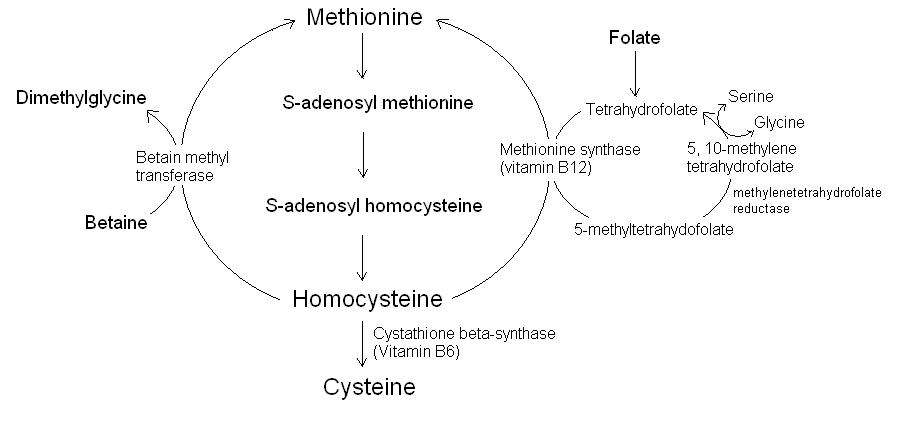Homocysteine is a sulfur amino acid produced in the body from the demethylation of the essential amino acid methionine. The B vitamins folate, B6 and B12 are needed to metabolise homocysteine, and if these vitamin are deficient in the diet homocysteine levels can rise and cause damage in the vasculature of the body. The metabolism of homocysteine is shown in figure 1. High levels of plasma homocysteine were first implicated as a risk factor in the development of cardiovascular disease over 40 years ago by the researcher Kilmer McCully. Since that time numerous studies have confirmed his findings and high levels of homocysteine are now thought to be one of the leading causes of vascular injury. In addition, research is beginning to piece together the involvement on homocysteine in the development of dementias.
 Figure 1. The metabolism of homocysteine.
Figure 1. The metabolism of homocysteine.
For example, a study published in the American Journal of Clinical Nutrition in 20051, looked at the memory, verbal fluency and constructional praxis of 321 aging men. They found that low levels of folate, B12 and B6 and high levels of homocysteine were predictive of cognitive decline. The authors concluded that B vitamins were important in preventing cognitive decline in men. Another study, published in the American Journal of Nutrition in 20042 looked at the cognitive impairment of 228 subjects and found that folate levels were significantly lower and homocysteine levels significantly higher in those with mild dementia than control subjects. Both of these studies would tend to suggest that homocysteine does indeed play a role in the development of dementia and that the B vitamins folate, B12 and B6 are protective of certain types of mental decline.
Because homocysteine can be controlled without expensive drug, the pharmaceutical companies, mainstream medical establishment and media has completely ignored the role it plays in a number of diseases. All it takes to lower homocysteine plasma levels are adequate amounts of B vitamins which can be attained from a good strength multi‑vitamin. A protective intake of vitamin B12 and B6 is in the > 50 mg per day range, with intakes of folate at > 400 microgram per day. It is impossible to get this sort of level of these vitamins from even the best diets and so it is absolutely necessary to supplement to attain this protective homocysteine lowering effect. In addition to protective against the development of dementias, these B vitamins will also reduce the risk of developing heat disease, where high homocysteine levels are also implicated.
RdB
